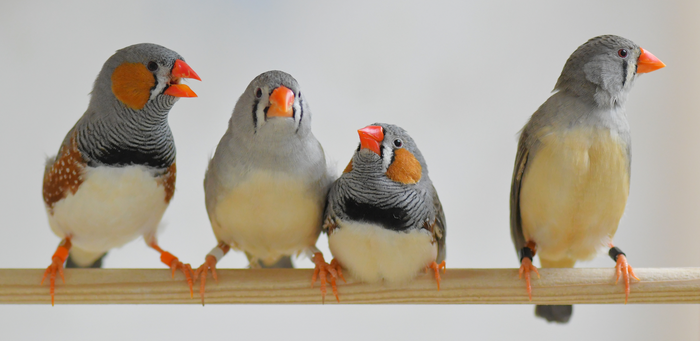Male zebra finches learn their song by imitating conspecifics. To stand out in the crowd, each male develops its own unique song. Because of this individual-specific song, it was long assumed that dialects do not exist in zebra finches. However, with the help of an artificial intelligence technique, researchers at the Max Planck Institute for Ornithology (Biological Intelligence, in foundation), have now been able to show that the songs of four different zebra finch populations differ systematically. They also discovered that these “cryptic dialects” are decisive for the females’ choice of mate. Thus, female zebra finches pay more attention to a cultural trait than to male appearance.

Credit: MPI for Biological Intelligence, i.f. / Wolfgang Forstmeier
Male zebra finches learn their song by imitating conspecifics. To stand out in the crowd, each male develops its own unique song. Because of this individual-specific song, it was long assumed that dialects do not exist in zebra finches. However, with the help of an artificial intelligence technique, researchers at the Max Planck Institute for Ornithology (Biological Intelligence, in foundation), have now been able to show that the songs of four different zebra finch populations differ systematically. They also discovered that these “cryptic dialects” are decisive for the females’ choice of mate. Thus, female zebra finches pay more attention to a cultural trait than to male appearance.
To us, bird song may just sound pretty. However, if we want to understand why birds sing, we have to consider that song may have multiple functions. A male’s song may serve to repel a male neighbor, or to attract a female. In either case it should be clear from the signal who the sender of the message is. Which species is it, and which individual?
Songbirds vary widely in how they sing. In some of the >5000 songbird species, the males are real ‘virtuosos’. Throughout their life, they acquire new sounds and thus can vary their songs accordingly, possibly because this impresses the females the most. In other species, such as the yellowhammer, males are a lot more stereotypic and uniform. They copy the sounds of their conspecifics as closely as possible, and thereby make it easy for anyone to recognize the species. However, such species with ‘uniformist’ song often show variation at a larger geographic scale. Within a region, all males sing their song in the same way, but between regions, songs differ and obvious borders can be identified where two dialects meet.
Each male zebra finch devlops his own song
Zebra finches belong to a third singing type. Males also learn their song from conspecifics and only at an early age, but they do this in an individual-specific manner. Each male develops his own little song which he then uses for a lifetime – as if he wanted to communicate his identity, his name. Because of these individual signatures in songs, it has long been assumed that dialect formation is not possible in zebra finches. However, together with collaborators, their doctoral student Daiping Wang and other members of their research group, Wolfgang Forstmeier and Bart Kempenaers have now been able to detect dialects in zebra finch songs using artificial intelligence.
To do this, the researchers trained a “Sound Classifier” with the songs of males from four different, separately kept zebra finch populations. When the scientists fed the program with the songs of subsequent generations, the program assigned them to the correct population with remarkable accuracy. Wolfgang Forstmeier, one of the two lead authors of the study, explains: “We were indeed surprised by this result. It appears that there are cryptic dialects in zebra finches, which remained undetected by conventional analysis methods.”
Foster parents with different dialect and appearance
Importantly, the new study also shows that these dialects are biologically highly relevant, as they play a key role in mate choice. The researchers conducted so-called “cross-fostering” experiments to tease apart the roles of genes and culture in mate choice. For this purpose, zebra finch chicks of one population were raised by zebra finch parents from another population. This led to zebra finches with different combinations of genetic traits (e.g. body size) and culturally acquired traits (e.g. dialect). All zebra finches were fitted with a small backpack carrying a QR code and released together in a large aviary. Using a camera-based system that detected the QR codes allowed the scientists to automatically track all social interactions. As it turned out, females preferred partners who sang the same dialect as the males with whom these females grew up. This effect of dialect preference was much stronger than the tendency to choose a mate based on his appearance.
“What I find particularly fascinating about this study is that the application of artificial intelligence is not just used to confirm existing knowledge. Like an interpreter, the Sound Classifier helped us to discover something about zebra finch communication,” says Wolfgang Forstmeier. “That is the more remarkable, because zebra finches have been a model system for song learning for so long” adds Bart Kempenaers. “Just because we can’t distinguish these dialects, doesn’t mean they don’t exist.”
Journal
Nature Communications
DOI
10.1038/s41467-022-28881-w
Method of Research
Observational study
Article Title
Machine learning reveals cryptic dialects that explain mate choice in a songbird.
Article Publication Date
28-Mar-2022




